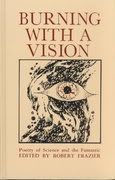
Some of the pieces, to me, push the limit of what we should rightfully consider speculative poetry, while in other cases, it's very exciting to see the poetry from writers we might otherwise connect with novels and short story forms, such as Gene Wolfe, Roger Zelazny and Ursula K. Le Guin.
Diane Ackerman has some of her early work featured here, and Minnesota is well represented with the work of Terry A. Garey and Ruth Berman.
Alan Lightman, who wrote one of my favorite books, Einstein's Dreams, has a piece. Bruce Boston, who's won numerous Stoker Awards and Rhyslings for his poetry is of course also in this anthology.
I would definitely have liked to have seen more biographical notes on these writers, but fortunately we have the internet so it's not too difficult to track most of them down to see where they went in the last 27 years.
The backtext of Burning with a Vision goes as:
"poetry that launches you into the future, into the fantastic. Here you will find the current state of the art in speculative poetry. Robert Frazier has gathered together the best work by such reknown writers as Loren Eisley, John Ciardi, Ursula Le Guin, Gene Wolfe, Thomas M. Disch, Phillip Jose Farmer, Brian Aldiss, and many more. Their poems range from metaphysical speculations to light verse, in fixed forms and free. Together they point out an entirely new direction for twentieth century poetry.
'We live in a scientific age, an age of discoveries. Daily, mankind's knowledge expands, as we touch upon new ideas and images: computers, robots, spacewalks, artificial hearts, probes to the planets. Only speculative writing can keep up, as things which used to be science fiction have become everyday realities; and we continue to peer into the strange and exciting future that awaits us. It is only natural that modern poetry responds to this stimulus, use these new images, metaphors, words, and concepts. If poetry is to be about life, about the poet's world, then a significant poetry of the twentieth century must be scientifically inspired, speculative and often fanastic.
'Let the poets in the anthology travel with you as guides into your imagination. Faster than light?...faster than time?...All you will know is that you too are Burning with a Vision."
It's a little ambitious and long-winded, I admit, and I can't read it without hearing the voice of the fellow who does those early 20th century newsreels. Still, I wonder how we'd write such an introduction today.
This particular anthology doesn't reflect the voices of Asian Americans who were writing during this time, as far as I can tell. So, one of these days I'll have to check back through my collection of Asian American poetry books and see how many from the 1970s and 80s have pieces that would have been interesting additions to Burning with a Vision.
If we were going to make such an anthology today that included Asian American voices, I'd definitely include work from Cathy Park Hong, for example, Mark Rich, Anthem Selgado, Barbara Jane Reyes, and Burlee Vang.
Burning with a Vision arguably suffers from occasionally presenting some of the poets' works in a very cramped format rather than allowing it to breath fully. But given the 1980s and the proposition of an entire anthology of speculative poetry, I can see how decisions might be made like this. In contrast, Time Frames really let the poets have enough space to show us a wider range of their work, although the result is a shorter list of poets represented. Perhaps every anthology is a compromise in some area.
As a starting point, Frazier's work definitely gives us something meaty to respond to and to draw inspiration from. I'd consider it an essential text to understanding how we got to where we are today in contemporary speculative poetry.
No comments:
Post a Comment